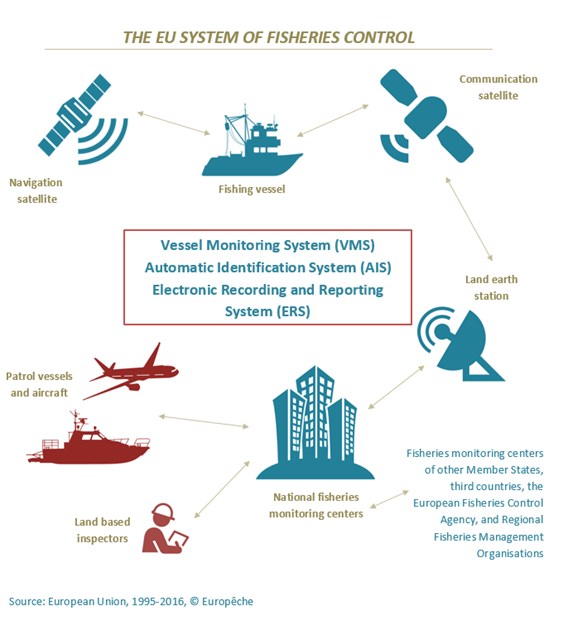The Fishing Industry Cannot Currently Be Relied Upon Updated
The Fishing Industry Cannot Currently Be Relied Upon
After tracking the satellite messages transmitting the position of 70.000 fishing vessels for the past iv years, a grouping of researches [1] claim that commercial angling covers over 55% of the ocean's surface. As a result, their report states that the area fished is iv times bigger than the area occupied past agriculture in terms of square kilometres. Europêche argues that the study does not provide any new insight since fishing vessel monitoring systems have been widely implemented and enforced across the oceans for decades showing the verbal location of our vessels to the competent authorities. In addition, the report is based on scientifically unsound information, overestimates the proportion of the seabed where angling occurs and has piffling use for fisheries management.
The automatic identification system (AIS) is a tracking system used on ships to provide information on the vessel's position, class and speed. Its main purpose is to avert standoff between vessels from all sectors and not to control fisheries nor assess its footprint. The leading research system, Global Line-fishing Watch, has been analyzing the data nerveless from, every bit they say, "known or possible commercial angling vessels" based on changes in vessel speed and direction. However the organisation acknowledges in their website [ii] that the system "may show apparent fishing activity where fishing is not actually taking place" and for that reason included the following liability disclaimer: "Any/all Global Fishing Watch information about credible angling activity should be considered an estimate and must be relied upon at my own adventure (the database user)."
Javier Garat, President of Europêche alleged: "It is appalling to run across how an organisation using non-reliable information is allowed to publish a study based on estimates and assumptions in a scientific periodical. AIS is a tool for safety purposes, never designed to be a policing or scientific tool since it is not encrypted and it tin be hands altered. Autonomously from AIS, the Eu fishing fleets are equipped with secure and effective monitoring, control and surveillance systems thoroughly checked past the competent authorities to runway all line-fishing vessels' activities."
According to the abstract of the report, industrial fishing occurs in over 55% of the ocean. The immediate conclusion is that angling vessels operate everywhere and infers that the industry is putting more pressure on fish populations. Europêche argues that the tuna fisheries in the high seas constitute the majority of the "footprint", which take been monitored and controlled for decades past Regional Fisheries Management Organisations (RFMOs). Tuna is a highly migratory species and therefore line-fishing vessels spend many days chasing the fish beyond the oceans without deploying the line-fishing gear. Even so, the written report considers this as angling, enlarging the surface to their convenience. Furthermore, this blazon of line-fishing has very little bear on on the marine environs. For most of the areas, fish stocks are in fact performing well since 78% of the tuna global grab comes from healthy stocks, and this fishery is well documented and globally stable.
Europêche stresses that the global fishing footprint cannot be compared to agriculture, equally the latter totally eradicates the natural ecosystem by transforming it and eliminating the native flora and fauna. Tuna line-fishing has no impact on the marine seabed and solely affects the acme predators' abundance which recovers over time. Therefore, compared to other animal protein, wild-caught fish has a significantly lower carbon footprint due to the fact that it does not need to be artificially fed nor does it require the use of h2o supply.
Concerning the footprint of bottom trawlers, information technology has been mapped in much higher resolution already in many parts of the earth thanks to the delivery of the fishing industry and, according to the University of Washington fisheries researcher Ray Hilborn, the report overestimates the proportion of the seabed impacted by trawls by 10 fold.
The study finds that large regions of the sea are not heavily fished, and these areas may offer opportunities for low-cost marine conservation. Europêche claims that autonomously from the fact that information technology is quite alarming that a scientific paper formulates controversial policy deportment at global level; closing an area to fishing must be based on a scientific recommendation plus a previous impact cess on a case past case basis and non because information technology is cheaper. In improver, it should bring a tangible benefit for nature compared with the previous situation.
Javier Garat concluded: "This type of studies, far from providing objective and scientific information, only serve to misfile and deceive public stance, and obey other interests distant from sustainability and practiced governance of the fishing activity. The reports fails to reverberate that the Eu fishing fleets comply with the highest labour, training, safety, ecology and hygiene standards and are well-monitored by the use of several modern electronic and satellite systems. Information technology is therefore clear that the footprint of a European vessel cannot be compared with that of an Asian fishing vessel, as the study portrays."

Ends
Europêche represents the fisheries sector in Europe. Currently, the Clan comprises 10 national organisations of fishing enterprises from the post-obit 8 EU Member States: DE, ES, FR, IT, MT, NL, LV, PL.
Printing contacts:Daniel Voces, Managing Director of Europêche: +32.2.230.48.48 daniel.voces@europeche.org
[1] Namely, the collaboration between researchers from the Global Fishing Watch, the National Geographic Society's Pristine seas project, University of California Santa Barbara, Dalhousie Academy, SkyTruth, Google, and Stanford Academy.
[2] https://globalfishingwatch.force.com/gfw/GFWRegistration?startUrl=/gfw/s/data-download
Tags: footprint, fisheries, control, Monitoring, AIS, VMS, logbook, Global Angling Watch, RFMO
The Fishing Industry Cannot Currently Be Relied Upon
Posted by: beverlytakintime.blogspot.com
0 Response to "The Fishing Industry Cannot Currently Be Relied Upon Updated"
Post a Comment